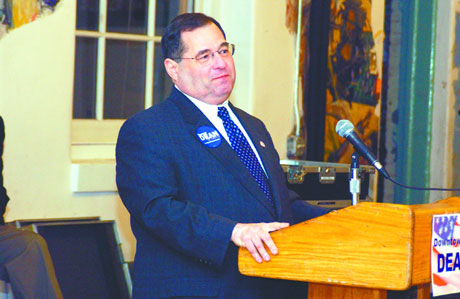City Dems, including queer politicos, undertake massive mobilization to ensure a landslide
The Gay and Lesbian Independent Democrats (GLID) and the presidential campaign of former Gov. Howard Dean sponsored a forum, “Downtown for Dean,” on January 11 at the Lesbian, Gay, Bisexual and Transgender Community Center that signaled the strong support in the city coalescing around Dean’s candidacy.
State Senator Tom Duane, the state’s first gay elected official to endorse Dean, indicated that the club’s footwork would prove crucial in the upcoming tasks necessary for a strong Dean victory in New York. Duane also announced the opening of a Dean campaign office in the West Village at Bank and Hudson Streets.
Ethan Geto, a longtime gay activist, is the New York State chair of the Dean campaign and Sunday night’s forum indicated the breadth of support he has garnered for Dean from within the city’s elected Democrats.
Dean has gained a surfeit of endorsements, including a majority of the members of the City Council and New York’s Democratic congressional delegation.
U.S. Rep. Jerold Nadler addressed the forum and spoke of the upcoming Iowa caucuses on January 19 and the New Hampshire primary on January 27.
Both contests are seen as bellwether tests of presidential candidates’ political viability and, in polls, Dean leads in New Hampshire by a comfortable margin. However, in Iowa, polls indicate that Dean is in a close fight for first place with Rep. Richard Gephardt of Missouri.
Thus far, Dean has raised approximately $40 million from donors, an historic sum for a Democratic presidential candidate. Due to that fundraising success, as well as polls in many states, including New York, that indicate voters’ preference for him, press reports consistently refer to Dean as the frontrunner.
Nadler cautioned that his frontrunner status does not guarantee Dean the nomination in the immediate aftermath of New Hampshire and offered his political insight into how New York’s March 2 primary, the same primary day for nine other states including California, might prove crucial in determining the Democratic nominee.
“I predict that by mid-March the nominee will be known,” said Nadler. The congressmember stated that Dean was the sole Democrat with the fundraising prowess to compete with the $130 million and growing re-election fund amassed by President George W. Bush’s campaign.
Geto, a veteran political strategist, echoed Nadler’s assessment that New York’s will serve as the definitive primary contest. “Giff Miller hit it on the head when he said that New York will be decisive,” said Geto, referring to the speaker of the City Council, a Manhattan Democrat who was instrumental in getting most of his colleagues on the Dean band wagon.
Geto indicated that former General Wesley Clark’s recent surge in New Hampshire polling might ensure the former NATO commander a strong second place showing, which threatens to “becomes the story” on the evening of January 27. “We’re really trying to hold down Clark’s growth in New Hampshire,” said Geto. “That’s why we’re trying to send as many New Yorkers up to New Hampshire each weekend as possible.”
Brad Hoylman, GLID’s president, later elicited volunteers to sign up for a van trip to New Hampshire the weekend of January 23-25 to canvass undecided voters in Concord.
According to the event’s speakers, New York’s status as a “firewall” state, ensuring Dean a bastion of support after a bruising primary fight and during a time in which Bush’s campaign has vowed to begin airing commercials, would allow the Empire State to enjoy political rewards from a Dean administration.
City Councilmember Christine Quinn, of Manhattan, spoke of a Dean administration as the city’s opening to redress specific needs abandoned by the Bush administration. “New York City has been massively shortchanged by the Bush administration on the environment post-9-11,” Quinn said. She criticized the White House for not conducting comprehensive hearings on how the World Trade Center disaster might have spread pollutants into the downtown area.
In a follow-up interview Duane shed further light on the political hypothesizing that was articulated at the Center forum. “New York will be the first big state after the February 3 primaries,” said Duane, referring to the seven-state contest subsequent to New Hampshire. Duane acknowledged that South Carolina’s February 3 primary would be an important indicator of which candidate African Americans, who constitute a crucial voting bloc in the Democratic Party, intend to support.
A December Zogby poll had Dean in first place in South Carolina, but those polling numbers will inevitably change following January’s early contest results. Furthermore, the March 2 election will be the first time this primary season that large metropolitan centers like New York City and Los Angeles go to the polls. “South Carolina does have a large African American population, but the difference is that New York’s Latino and African American voters are urban,” Duane said.



































